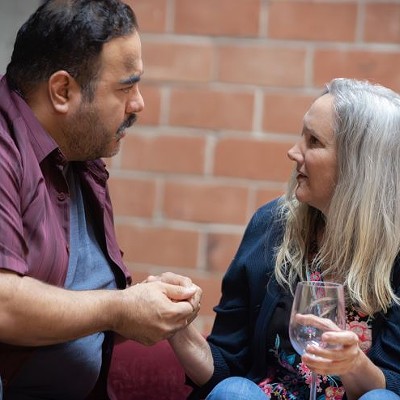"Generally we use single-use sterilized razor blades, the individually wrapped ones. It's usually not as much blood or as big a cut as most people think of it being."
Blut Katzchen has a softly lilting voice and sounds as comfortable speaking on the subject of bloodletting as some people do about the latest episodeof their favorite reality shows. She is a Black Swan, a person who allows herself to be cut and have her blood drunk by another individual. It's a very personal exchange for her, one she shares with a friendly but intense man who goes by the name of Reverend Michael Vachmiel.
Vachmiel has the demeanor of a man who has seen and experienced many things over the years, with an inner intensity forged from decades of watching his community grow and change. There are many subcultures living and prospering in Houston, but what sets Vachmiel apart from other community leaders in Houston is the nature of his group. They call themselves "real vampires" and live lives that draw inspiration from the supernatural monsters of folk legends and horror films.
Over the past three decades, a variety of factors have come together to create the "real vampire" subculture and make it a viable lifestyle for people drawn to it, including some members of the BDSM scene. The Gothic music scene gave people with vampiric leanings a sound track and a community to live in and made Houston clubs such as Numbers important vampire stomping grounds. As the Internet bloomed and affected almost every facet of modern life, networks were created for those individuals who lived their lives as vampires, and a popular role-playing game also helped shape the structure of the local vampire community.
While it might be tempting to write off the idea of "real vampires" as some sort of elaborate joke, those within the subculture take it very seriously, believing that they are born different from others. While they often vary widely in their customs and their observance of vampiric traits, they all share the belief that they need to feed on the blood or psychic energy of other individuals to maintain a healthy emotional and physical state of being. They believe that, while all living things produce a kind of life energy, they're not able to create enough on their own and can feel the deleterious effects of that deficiency. Vachmiel claims that vampirism, rather than a chosen lifestyle, is an inborn condition for these individuals.
"You can't be turned into a vampire; you're either born one or you're not. This is something that people might take years to come to terms with before they discover their true nature, but they'll find that they need additional life energy from others to feel physically and emotionally well. They find they need an external source of that energy to fulfill that need in their life," he says.
Most vampires also reject many of the powers and attributes of their mythical counterparts, drawing important distinctions between what they feel is real and what is not. Almost no members of the real-vampire community claim to be immortal or to have the kinds of magical powers seen in movies. As Vachmiel explains matter-of-factly:
"Not all of us drink blood. I do sometimes; others feed on the psychic energy of others. We can't change into bats or fly. Those types of powers are pure fantasy."
While there are groups of people who identify as real vampires worldwide and around the United States, Houston has a surprisingly large population of them. While many of their activities are private in nature, mixing elements of dark sexuality and pagan beliefs, there are also organized groups engaged in a large variety of activities, some of which are open to the public. Local groups like Allied Night Kindred Houston and The Houston Vampire Court have promoted music and social events at area nightclubs, which are open to both vampires and anyone else who's interested.
To outsiders, these real-life vampires might inspire fear or ridicule, but to those who make this their lifestyle, it's taken entirely seriously. When asked how he deals with outsiders who criticize his beliefs, Vachmiel laughs a bit before responding:
"There have been real vampires forever. It's like any other spiritual belief; people either will believe it or they won't. As such, you can't convince them or provide 'proof.' It's personal, and it's self-awareness. Self-awareness isn't created by committee or societal approval. You know who you are, and you act upon it to bring fulfillment into your life."
As a community, Houston's vampires function in much the same way as more conventional groups of people do, creating a network in which individuals have organized with others like themselves. While there have been power struggles and at times infighting, these groups and individuals have carved out a working subculture for themselves, complete with community leaders, communication infrastructure, customs and rules of conduct.
The Bayou City is home to millions of people who have set down roots and are living productive lives here.
And some of them are vampires.





